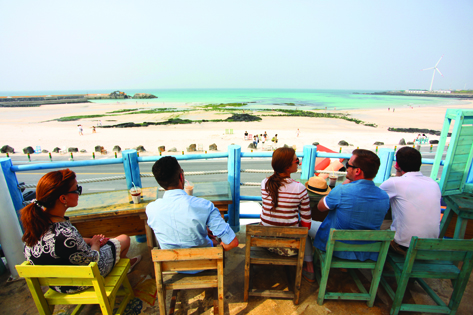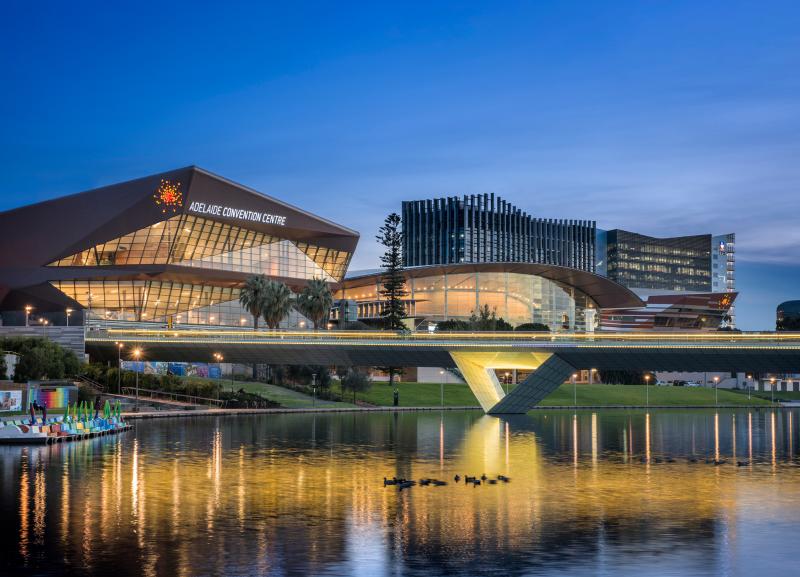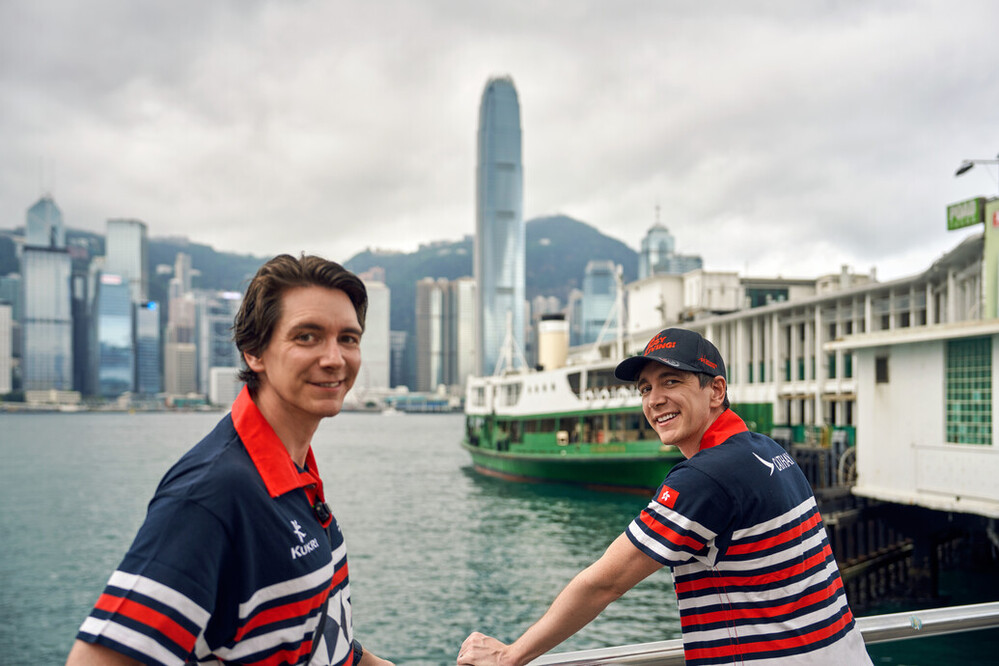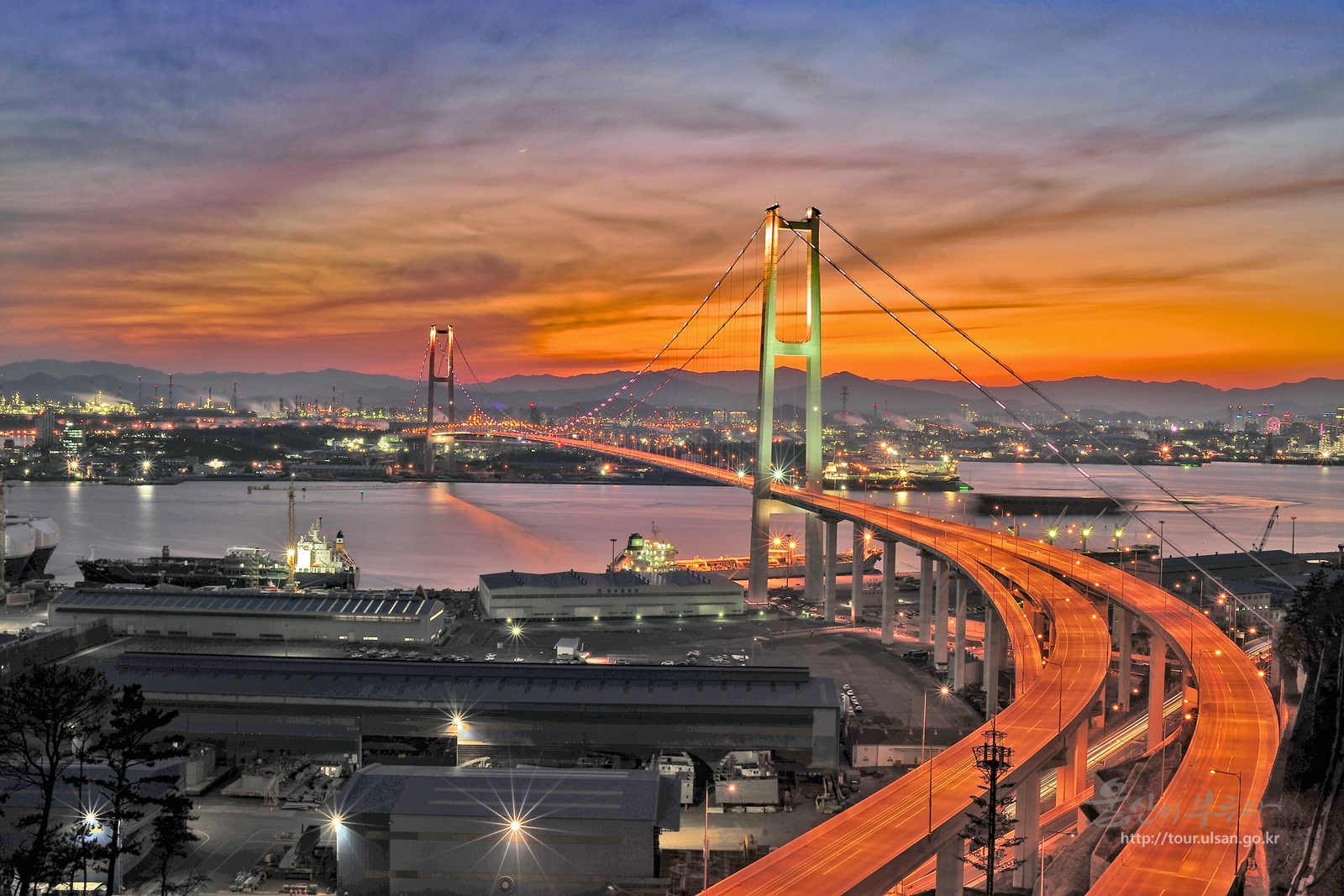RIVAL destinations can offer modernistic glitz and bright city lights as a backdrop to woo conference and incentive groups, but much of that wallows in the mundane compared to the rugged beauty found on Jeju. Yet South Korea’s main rocky outpost strives for a futuristic approach to sustainability, eco-design and conferencing.
Jeju’s geological features have long fascinated visitors, earning the island Unesco World Heritage status, while its haenyo women divers have been recognised as providing the world with an intangible cultural heritage worthy of preservation.
While time has stood still for the distinct landscapes around Hallasan – South Korea’s highest mountain – and the volcanic tubes skirted by beaches and trails for the past two millennia, the Jeju and Republic of Korea authorities are banking on sustainability when it comes to MICE visitors and development for the 1,848 sqkm island.
The island’s efforts to work alongside its community, with nature and culture being preserved, paid off in 2017 when Jeju was ranked 15th in the world and fifth in Asia by the Union of International Associations (UIA) and in 2018 gained a 17th place in the ICCA Asia rankings for meetings, one place ahead of neighbouring Busan.
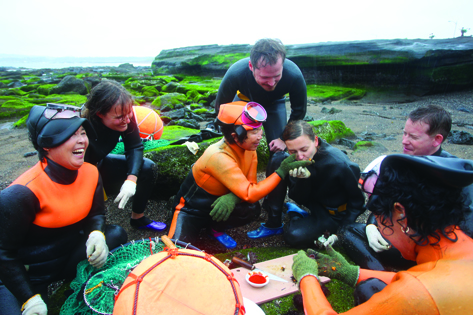
The sturdy haenyo women who for generations have dived without breathing apparatus for abalone, shellfish and other treasures of the deep have been recognised as an intangible cultural heritage by Unesco. There is also a museum on Jeju dedicated to the haenyo tradition.
Such is the importance attached to attracting overseas visitors to Jeju – with a keen eye on the China outbound market – that all ordinary passport holders, with a few exceptions, can stay visa-free for 30 days, even if they normally require a visa for South Korea.
A second airport is due for completion in 2025, and a new convention centre is on the cards, with Jeju’s profile anticipated to rise as markets across Southeast Asia are tapped. A number of India-outbound DMCs, for example, already work with Jeju Convention Bureau.
The island’s verdant vistas even captured the heart of Viktor Ryashencev when he stayed in Jeju to further his Korean language studies. After graduating in Vladivostok, he decided to return to the island and set up Jejuco Suites and Tours.
“There’s a big contrast with other parts Asia, as groups from Thailand, Singapore, Malaysia or Indonesia find,” said Ryashencev.
“Jeju tourist infrastructure is highly developed, but more adjusted and getting used by Korean tourists who make up over 80 per cent in tourist inflow to the island. So far, it’s not that internationally oriented in general, but more focused on Korean tourism.”
The route between Jeju and Seoul-Gimpo is the busiest air route in the world by passenger numbers at an average of 178 flights daily, with the majority of visitors Korean leisure travellers. Despite this, the meetings and incentives market is indispensable to Jeju’s economy. For this reason, the Jeju regional government is promoting the island as a clean-energy and blockchain hub with conferences at its core.
JEJU UPDATES
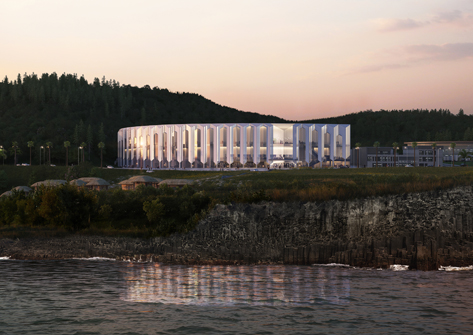
A new convention centre with expansive sea views in the 2nd Jungmun Tourist District, is expected to be ready by 2022. Described by the convention bureau as a “MICE multipurpose complex”, the four-storey building on a site of over 20,800 sqm will be built next to the larger ICC Jeju with a promenade for open-air events between the two buildings.
The new facility – seen in the above artist’s impression – will also be linked to the Jeju International Peace Centre and help form a convention district in the Jungmun area with the existing ICC Jeju.
Shinwa World
There is growing interest among conference organisers in this resort where Marriott Jeju Shinhwa World Hotels & Resorts – one of four hotel brands at Shinwa – opened in 2017. Marriott is set to open another wing with 144 rooms this year to make a total of 486 guest rooms, while a Four Seasons Resort & Spa, with 240 rooms, suites and villas, is scheduled to open next year.
Jeju’s Shinwa World has been opening in stages since April 2017, and Bloomberg scales the whole resort as five times the size of Tokyo Disneyland and with 2,000 rooms once fully opened.
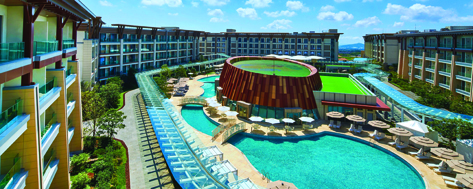
Meeting facilities at the resort have already come to the attention of meeting planners with the opening of Landing Convention Centre alongside Shinwa World Landing Resort.
Pacific World’s Seoul office is already working on a proposal for a 1,000-delegate incentive at Shinwa World.
“Jeju is currently growing and has the potential to expand. Shinwa World, our newest conference hotel complex, has a charm that comes from the beautiful nature that surrounds it,” said Suzi Nahm, of Pacific World Korea.
Jungmun
The Jungmun tourist complex, where ICC Jeju is located, offers a contrast to Shinwa’s resort vibe and is about a 40-minute drive towards the coast. The seven-storey ICC Jeju began operations in 2003 with venues that can host 4,300 delegates across conference halls, 30 breakout rooms and outdoor event space.
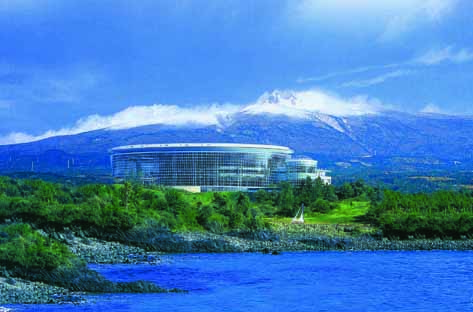
“ICC Jeju has as beautiful views and is right in front of the sea,” said Nahm. “The facility itself is not brand new, but it’s located in the Jungmun tourist complex and is close to four- and five-star hotels.”
While the design of the new centre alongside ICC Jeju is aimed at blending with the existing 5,000 sqm, seven-storey structure and the surrounding greenery, there continues to be concern among environmental groups on the island who fear developments that target overseas visitors will spark a Macau-style growth of casino resorts.
ARCHITECTURE & SEAWEED
CONVENTION bureau chiefs say forthcoming conferences reflect Jeju’s commitment to both its islander community and the environment – even though interest from casino-resort investors is never far away.The 2019 International Seaweed Symposium (ISS) will see more than 1,000 experts in the field gather in Jeju, while more than 1,000 specialists will arrive on the island a year later for the 30th Photovoltaic Science and Engineering Conference.
“Jeju is continuing to grow together with the local communities by hosting a multitude of international conferences and fostering industries which only Jeju can offer,” said a spokesman for Jeju Convention Bureau.
Associations concerned with natural science and the environment certainly see Jeju as an ideal backdrop for their conferences. However, as global DMC Pacific World’s Seoul office is discovering, Jeju’s geographical wonders also intrigue groups from sectors as diverse as architecture and fashion.
More: Jeju uses natural beauty to woo Southeast Asia
“Based on our experience, Jeju’s natural features attract fashion, art, and architectural industries, but there is also the potential to do conferences related to ecology and the environment,” said Pacific World’s Suzi Nahm.
Pacific World’s office in the Korean capital is organising a 200-delegate conference on Jeju for clients from the world of fashion, while incentives were arranged on the island for two architectural groups of 80 participants each who stayed at the Hyatt Regency.
Sites visited by the architects included the headquarters of IT company Daum; the Glass House at Phoenix Island Resort; Bangju Church; Bonte Museum (Seogwipo), the Biotopia eco-resort, and Osulloc Tea House.
Around 5,000 delegates from Junior Chamber International are also gathering at ICC Jeju, June 17-20, for their Asia Pacific Conference.
SMARTER, GREENER
Senior development officials in South Korea have agreed that the “fourth industrial revolution” must play a key role in attracting conferences and business events to Jeju.
The island is set to become a “Smart MICE Center, carbon-free Island, and Block Chain Hub City” to encourage sustainable development and raise the island’s profile among the international business events and conference organisers.
Officials say that over the next five years, US$150 million will be invested in 12 different industrial sectors in a bid to provide technical training, develop links with specialist educational institutions, enable more opportunities for meetings and exhibitions, and to customise tourism services, among other initiatives.
Around half the electric cars driven in Korea have been designed in Jeju and under the Carbon-Free Island 2030 Project, car-hire centres will be equipped with charging stations and solar panels.
